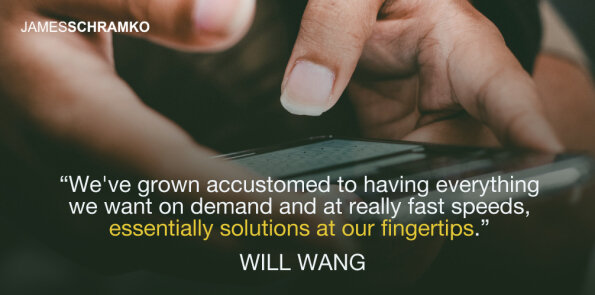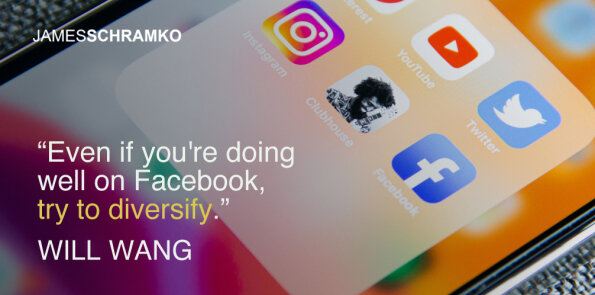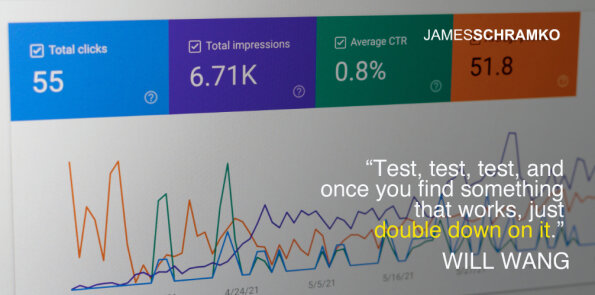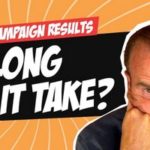Podcast: Download (Duration: 32:59 — 33.9MB)
Get Notified Of Future Episodes Apple Podcasts | Spotify | Amazon Music | Android | Blubrry | Gaana | TuneIn | Deezer | Anghami | RSS | More
Episode highlights:
We can’t control absolutely everything, but what we can control carries weight in our online marketing. [00:40]
A lot of marketers have grown unhappy with Facebook. Here’s what’s behind some of the dissatisfaction. [02:40]
As an agency owner, what changes has Will seen in terms of what does and doesn’t work? [06:50]
This strategy goes way back – ever mail in a coupon to win something? [09:17]
What do trashy magazines and spirit handles have in common? They’re precursors of Will’s second strategy. [15:55]
Number three is all about giving value first, better known as lead magnets. [22:44]
If Facebook isn’t working (and even if it is), you’ve got options. [27:46]
The old-school stuff is coming back, because even though less people do it, it works. [29:54]
Step up your marketing with help from James
Will Wang is no newcomer to the show. He and James have chatted often in their Get Clients Series. Their latest topic is sweet for James, because of its relation to his concept of OwnTheRacecourse, at the core of which is control – controlling, at least, what’s reasonable.
What can’t you control? What can you?
What’s reasonable, says James, because of course we can’t control absolutely everything. There are elements of control we can have. What’s dangerous is depending heavily on someone else having all the control.
“We can’t control everything. – James Schramko”
One platform that many have become dependent on for their businesses is Facebook, so James would like to talk about that.
While James says he has done fine without Facebook, he does publish on other platforms. That’s part of OwnTheRacecourse, to put your horse on other people’s platforms and bring back the prize money to fund your own platform that you can control.
“The most control you have is your database. – James Schramko”
The most control you have is your database, which you can move from one email provider to another. And you can control where you point your domain name, and where you store your backup files. So there’s much you can control.
The sensitive topic of Facebook
The changes that are happening with Facebook are something of a sensitive topic. The shifts have turned a lot of people off the platform. What is Will seeing in this regard, as an agency owner?
Over the last two years he and James have been talking, says Will, there’s been a gradual change wherein Facebook are getting more and more restrictive in terms of the data that advertisers get. They’ve made it so it’s better to keep people on the platform, but at the same time it’s becoming much harder for advertisers.
Some of it is Facebook’s fault. Some isn’t. There was that iOS clash that took away a lot of good data. And now, Facebook has stripped out a lot of the interest targeting that advertisers used to have, making it more difficult to use as a platform.
At the same time, as the big corporates have figured out the algorithm, bigger and bigger advertisers are coming through. The big multibillion advertising budgets are squeezing out a lot of the smaller businesses. For perspective, if you’re spending half a million a month, that doesn’t compare to what some bigger companies are spending. So it’s getting harder on the platform for independent advertisers.
So we have to think the platform is geared around the big spend, says James. Does Will think the removal of interest targeting is somehow linked to whistleblowers who have called attention to Facebook’s keeping people on the platform against their best interests?
Will thinks it’s a mix of things. He thinks there’s definitely an element of people realizing how much data Facebook has on them.
The other side is, with big advertisers coming on board, one of the key metrics is brand building. Because once a company hits a certain stage, the direct response stuff doesn’t matter as much. It’s more about the branding.
And what Facebook has started to realize is, they get so many small issues and complaints from smaller advertisers, whereas the big players are spending hundreds of millions of dollars and not raising a single ticket. They don’t care about the small stuff – they just want brand exposure.
So Will thinks Facebook has figured, why not make it easier and more profitable on themselves and just go after the bigger end of town?
The factor of whistleblowers, yes, says Will. The bigger advertisers coming on board, yes. And third, he thinks, Facebook have had a massive drop in share price, so they’re trying to get bigger marketers. It’s the balance of how much money they’re making, how much the profit is, and how much support they’ve got to provide to get the same profit levels.
What is and isn’t working since last year?
So what’s Will seen to work and not work, compared to last year?
The biggest change he’s seen, Will says, is removal of some of the interest targets. They had clients whose campaigns were working quite well, and overnight, performance dipped. This was worrying, a signal that something was wrong with either the tech or the platform. And the clients’ tech was fine, so it had to be the platform.
As Will and his team started to troubleshoot, they realized a lot of the interest targets they had previously had dropped off, even some of the bigger ones like Tony Robbins.
There was a lot of change around that, and it’s potentially something they’ll be seeing more of, or the interests will become higher level and broader. This means ads will be shown to more people, but they might not be as targeted as they used to be.
What does that mean for the user, asks James?
It means, says Will, that instead of FB finding someone likely to but or become a lead, they’re showing ads to a wider range of people. That means it will cost you more to get in front of the right crowd. Your campaigns will go up in cost, and you’ve got to find different ways of using the platform. You won’t have the targeting stuff that used to work before, where you’d build up layers of audiences.
It may actually be better now, Will says, for a good marketer, because they can go back to the basics of marketing and human psychology, the things that work long term.
So the three strategies that Will is sharing, asks James, will they work for business to consumer, B2B, or are they universal?
They’re mostly universal, says Will, but he’ll share specific examples for both in terms of how they’ve used them for B2B and B2C. More important is understanding where they came from. These strategies have been around for thousands of years, and will likely be around for thousands more, which is why Will likes them.
Competitions are making a comeback
Number one is all about competitions. Time was, you’d clip a coupon or condition from a newsletter or magazine, and mail it in to win something. That, says Will, is coming back.
At Growth Labs, they currently run competitions for some of their clients. And they’re seeing great results like leads for less than a dollar, unheard of on Facebook for the past couple of years.
Just for comparison, asks James, what would a lead cost for webinar registration?
Anywhere upwards of $20 or more, Will says. And off the back of that, only 20 percent of people actually turn up. Very expensive. With a good competition, you can get the same leads onto your email list for less than $1.
And then you can invite them to a webinar, says James.
Exactly, Will concurs.
He’ll go deeper into the topic of competition. What are the things he’s seen to make it work? First and foremost, you need your own racecourse, as James says, and you need your own nurture system after competition.
So even if someone registers for a competition, it doesn’t make them necessarily a good lead. You’ve got to nurture, and you’ve got to qualify, things you do with emails.
“The most important part of a competition is having a relevant prize. – Will Wang”
And the most important part of a competition is having a relevant prize. Offer an iPad, and everyone and their dog will be registering. There’ll be fake names, fake emails, multiple accounts, all for the chance to win. So you need a prize relevant to what you’re trying to do.
In a B2B context, for instance, you might give away a free marketing campaign. That will get you only respondents who have businesses, because who else would need such a prize?
And obviously, it has to have value. No one’s interested in a $10 prize. Make it around $500 or $1000. That’s what Will has seen to work well.
The second part, which online lends itself well to, is virality. Whenever they run a competition, says Will, he wants everyone who enters to bring someone else with them.
They used to do that via Facebook Messenger chat, which doesn’t work anymore. It’s just running the risk of getting banned.
What they’ve seen, though, is you can send people emails. That first email you send confirming registration can get a 60, 70 percent open rate. You can use that email to drive virality and get people to register or share with their friends and get more tickets coming through.
Wouldn’t that reduce their chance of winning, asks James?
You’ve got to incentivize it, says Will, make it a no-brainer to share. So if they share with one friend, give them three extra entries.
And do they use any plugins or tools to speed it up, asks James? He knows some platforms can unlock new content once people land on a page. Can Will take people off the platform with the Facebook ad, or do they stay on FB?
They take everyone off platform, Will says. And if you Google, you’ll find a whole variety of competition gadgets. He and his team use a third party app, especially with the tracking of who’s referred and how many tickets people get.
James is right, the idea of unlocking someone for referrals is great, and they use that as part of their strategy.
It’s built into 10XPRO, says James, which is why it came to mind.
Quiz funnels and personality questionnaires
The second strategy is quizzes and personality. If you recall old school, trashy magazines, there’s be those quizzes – what type of lover are you? What’s your spirit handle?
It talks to people’s curiosity and their sense of self. These are also played out online a lot, like what celebrity are you? People are focused inwardly, on themselves, which is not good or bad, but something that marketers can use. And it’s worked well in the past, and will potentially work well in the future as well.
It’s something Will has built lately for both B2C and B2B clients, to make it less work to give details and become a lead. Because people generally don’t want to read another 50-page ebook, and the cost of such lead magnets is gradually going up as well.
A quiz or personality questionnaire gives people an exact answer or solution for their problem, and gets you not just more leads, but better leads, especially in a B2B context.
Giving value first – lead magnets
What about number three, prompts James?
Number three, says Will, goes back to the idea of giving value first. Traditionally, it’s what’s called a lead magnet. And for the longest time, this has meant a guide, an eBook or a video on how to do something. But over the past decade, people have developed this blindness where they don’t want another eBook. They don’t want to read about their problem and try to figure out a solution.
 We’ve grown accustomed to having everything we want on demand and at really fast speeds, essentially solutions at our fingertips. So because buyer psychology has changed, the cost of lead magnet or eBook opt-ins has really gone up dramatically over the past couple of years.
We’ve grown accustomed to having everything we want on demand and at really fast speeds, essentially solutions at our fingertips. So because buyer psychology has changed, the cost of lead magnet or eBook opt-ins has really gone up dramatically over the past couple of years.
That said, there are types of lead magnets which are still working very well. Those are checklists and templates. And the reason is that the idea of a checklist or a template implies speed and ease of use.
James is a massive fan. On his YouTube channel, for instance, the videos that perform best give a framework or a checklist or a number of things, i.e. three marketing strategies.
And his earliest success online was using a cheat sheet, basically a short user guide on how to extract the most results from a website platform he was promoting at the time. And he built that into a six-figure business.
Why multiple platforms are a good idea
Now Will has a couple of bonus tips.
First one, just quickly, is to try different platforms. So if Facebook isn’t working, there’s no reason you have to stay on it.
Even if it is working, says James, there’s no reason you have to limit yourself to it. Imagine Facebook gets blown up tomorrow, that it is no longer legal to use. What would you do? And why aren’t you doing that now?
 Exactly, says Will, such a good point. He once asked a student, what would you do if you couldn’t use Facebook? And she came up with seven different creative solutions. So even if you’re doing well on Facebook, try to diversify.
Exactly, says Will, such a good point. He once asked a student, what would you do if you couldn’t use Facebook? And she came up with seven different creative solutions. So even if you’re doing well on Facebook, try to diversify.
It may be old-school, but it works
A second tip, Will says, is to try old-school stuff. Radio and TV advertising, magazine advertising, it’s coming back around. Because as more people jump off using that as an advertising platform, there are still people who do listen to radio, who do watch TV, and who do read magazines.
The numbers may decline every year, but there’s still hundreds of millions of people using those mediums. So until there’s no one on it, it still might be worth a test. And things like cold emails, like direct mail, sending mail to someone’s house, are still working at the moment.
 The old school stuff, Will thinks, will never go away. At least not in our lifetimes. So he’s always agnostic about the platform and the channel. If it works, it works. Test, test, test, and once you find something that works, just double down on it.
The old school stuff, Will thinks, will never go away. At least not in our lifetimes. So he’s always agnostic about the platform and the channel. If it works, it works. Test, test, test, and once you find something that works, just double down on it.
If you need help getting those quality leads for your business, look up Will at GrowthLabz.com.
Be one of the thriving entrepreneurs inside the James Schramko membership
Let the pros get you the quality leads you need
Liked the show? Enjoy all the episodes when you subscribe on iTunes









Leave a Reply